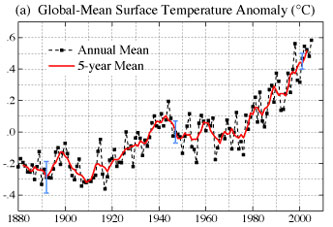
This morning I found Calvin Jones blog, Climate Change Action.
In WaPo today, there is an article about a new film documenting Al Gore's efforts to raise consciousness about global climate change.
Al Gore, Sundance's Leading Man: 'An Inconvenient Truth' Documents His Efforts To Raise Alarm on Effects of Global WarmingGlobal Climate Change is a topic worth discussing in the context of K4D. Conservatives (as opposed to conservationists -- isn't language strange) have in the past challenged the evidence that climate change is occurring. President Bush, the most prominent of the conservatives, has acknowledged that global warming is taking place. Indeed, he has promised to devote resources to research on the topic, to monitoring, and even to reduction of green house gas emissions. However, the Bush Administration has refused to ratify the Kyoto Protocol and its participation in the United Nations climate change conference (held from November 28 to December 9, 2005 in Montreal) was less than I had hoped. Even the huge price increase in gasoline and heating oil, and the dismal prospects for increasing world oil supplies, have not resulted in efforts by this Administration to encourage automotive fuel economy.
Other conservatives have used the term "junk science" as part of what Robert Kennedy has called "a campaign to suppress science that is arguably unmatched in the Western world since the Inquisition." Their's is a campaign generally against environmental regulation, including regulation aimed at reducing greenhouse gas emisions.
I would note that the international community has taken an impressive step to vet information in the creation by the World Meteorological Organization (WMO) and the United Nations Environment Program (UNEP) of the Intergovernmental Panel on Climate Change.
The role of the IPCC is to assess on a comprehensive, objective, open and transparent basis the scientific, technical and socio-economic information relevant to understanding the scientific basis of risk of human-induced climate change, its potential impacts and options for adaptation and mitigation.In its Climate Change 2001: Synthesis Report, the IPCC stated:
The Earth’s climate system has demonstrably changed on both global and regional scales since the pre-industrial era, with some of these changes attributable to human activities.A NASA study finds last year, 2005, was the warmest worldwide on record. The Precautionary Priciple suggests that we not wait for more complete knowledge, but act forcefully now to reduce the anthropogenic aspects of global warming, as well as to help ameliorate the social and economic impacts of the climate change that seems sure to come.
The focus of this blog has been to encourage building knowledge systems to support social and economic development and the aleviation of poverty. I have emphasized often the need for more and better knowledge for development. But, as in the case of global warming, there is a significant danger in delaying appropriate action in the search for more and better knowledge on which to guide action!
No comments:
Post a Comment